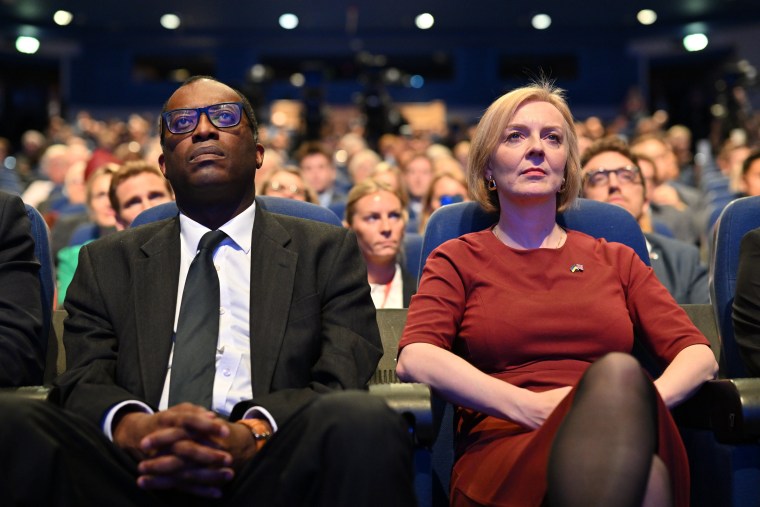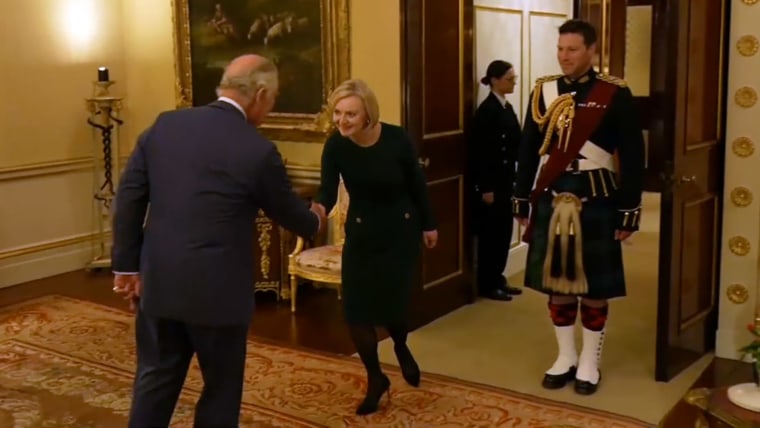
British PM Liz Truss axes finance minister, tax cuts that sent pound crashing
LONDON — Embattled British Prime Minister Liz Truss axed her finance minister and a flagship policy Friday, in a bid to save her job after weeks of market panic stoked by her economic plan.
Truss announced at a news conference that she would scrap a planned tax cut, the latest reversal in the face of mounting political and economic pressure.
She added that she was "absolutely determined" to carry on, saying she had changed course "to reassure markets of our fiscal discipline.”
She was also seeking to reassure her ruling Conservative Party, whose polling numbers have plummeted alongside the value of the pound — fueling speculation that she could be ousted just weeks after taking office.

Truss said she stood by her radical low-tax strategy and remained "ambitious for growth."
"But it is clear that parts of our mini-budget went further and faster than markets were expecting," she added. "So the way we are delivering our mission right now has to change."
She scrapped plans to keep her predecessor Boris Johnson’s promise to raise corporation tax from 19% to 25%, an embarrassing climbdown from a pledge that helped her win the race to succeed the scandal-tarnished Johnson as leader.
Hinting at spending cuts to fund the remainder of her plans, Truss said that future "spending will rise less rapidly than previously planned," a move that will be pilloried by opposition parties as imposing further pain on a British public already facing a cost-of-living crisis.
'Back again, dear, oh, dear!': King Charles III greets PM Truss
Oct. 13, 202200:53Earlier, Truss removed Finance Minister Kwasi Kwarteng just 38 days after the pair took power. He had been the face of the tax-cutting “mini-budget“ that sent the pound crashing and fueled the country’s latest political crisis.
Kwarteng announced his departure on Twitter, saying: “You have asked me to stand aside as your Chancellor. I have accepted.” He had hastily returned to London earlier Friday from a meeting in New York, with the media tracking his flight as it arrived home.
He attached a defiant letter in which he said his strategy was right, failing to even mention the turmoil of the last two weeks. “Following the status quo was simply not an option,” he wrote.
Kwarteng becomes the second shortest-serving chancellor of the exchequer, as the British finance minister is known. He is second only to Iain Macleod, who died after 30 days in office in 1970.
In a written reply, Truss said: "We share the same vision for our country and the same conviction to go for growth."
"I deeply respect the decision you have taken today," she added, though it seemed clear that the decision was hers.
Truss' personal office confirmed the next finance minister would be Jeremy Hunt, a former minister under successive Conservative governments who twice stood unsuccessfully for the top job.
Hunt will set out the government’s medium-term fiscal plan on Oct. 31, the Treasury said in a statement, sticking to the date his predecessor had announced.
It remains unclear whether Friday's dramatic developments will be enough to save Truss, who as leader will be seen as ultimately responsible for the economic plan. Her short time in power has been dominated by the crisis, with growing reports that senior Conservative figures were plotting to replace her.
One tabloid newspaper on Friday pitted Truss in a race against a lettuce, asking readers if they thought she would lose her job before the unrefrigerated vegetable decayed.
Earlier this month, after repeatedly rejecting any suggestion of changing course, Truss scrapped a proposal to cut taxes for people earning more than 150,000 pounds a year ($167,000).
That failed to calm markets or lawmakers.
The plan involved cutting 45 billion pounds in tax ($50.4 billion) — more than the United Kingdom's annual defense budget — but without identifying either how this would be funded or what services would need to be cut as a result.
The proposal saw interest rates and mortgage payments rise, the value of the pound crash and the government’s cost of borrowing soar. More details on this were due to be revealed in a speech Oct. 31, but the political and economic damage had already been done.
The central Bank of England was forced to step in and buy billions of pounds of government bonds, known as gilts, to calm the market. As it did so, the bank warned of a "material risk" to the U.K.'s entire financial system.
On Tuesday, the bank said it intervened to stop a "fire sale." Crucially, the bank’s bond-buying program was set to end Friday, meaning the government had to convince markets its economic plan was sound to avoid further chaos.
The International Monetary Fund strongly criticized the unfunded tax cuts, while economists and commentators across the world questioned the wisdom of such a radical plan.
Both Truss and Kwarteng have long proposed low-tax, high-growth economic policies. They were among the co-authors of "Britannia Unchained," an ultraconservative treatise for economic reform published in 2012.
"The British are among the worst idlers in the world," the authors wrote. "We work among the lowest hours, we retire early and our productivity is poor."
Truss still holds to this analysis. At the annual Conservative Party conference, she told lawmakers and activists: "I have three priorities for our economy: growth, growth and growth."
Source: https://www.nbcnews.com/news/world/liz-truss-fires-kwarteng-tax-plan-sent-pound-crashing-rcna52236







